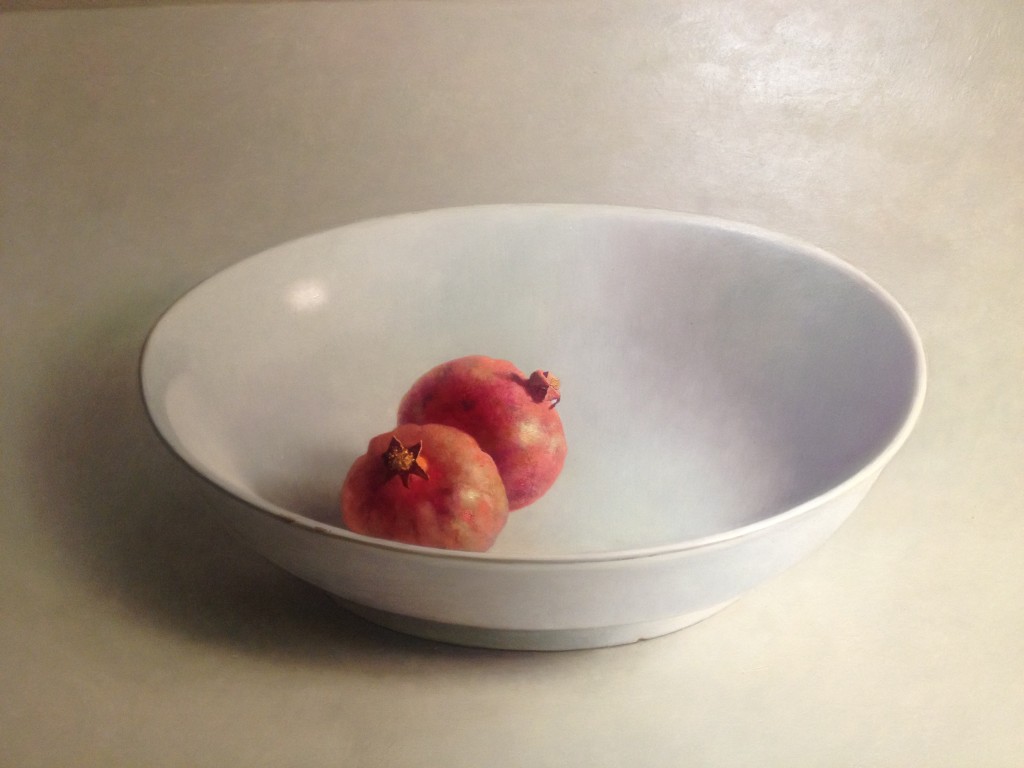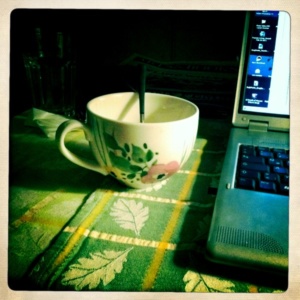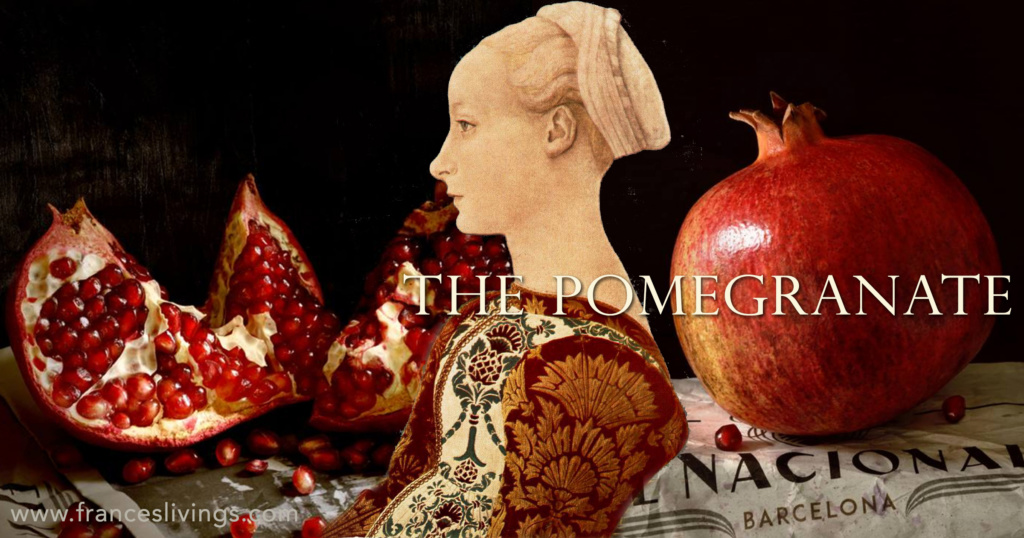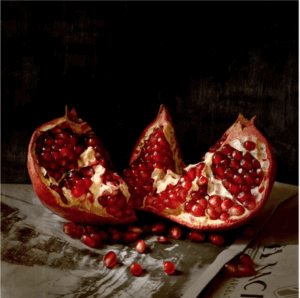Pomegranates are an ancient food, a globular-shaped fruit filled with juicy red seeds inside a hard shell, which appears in the mythologies and artifacts of several ancient Near Eastern cultures. Pomegranates are mentioned at least 25 times in the Old Testament. As a motif, it appears in embroidered form on the ephods of Israeli priests as well as in temple architecture, like in bronze on the pillars of Solomon’s temple. It is regarded as a sensuous fruit and appears in – amongst other poems – the flowery prose of the love poem, The Song of Solomon: “Let us get up early to the vineyard; let us see if the vines flourish, whether the tender grape appear, and the pomegranates bud forth. . .” (Song of Solomon 7:12)
In the quiet of a virgin morning, it feels right to sit with feet in warm slippers and a cup of hot steamy coffee in hand, and languidly let memories and fragments of ideas drift through the labyrinths of my brain. These are golden times, namely, when my monkey mind is still asleep – maybe simply exhausted from so much chattering, poking, and teasing. I can experience the same state of mind in the still of the night, when the dogs, like the day, are curled up to little furry donuts, quietly snoring away.
This is why I find that being in the flow of concentrated and productive writing is a lot like meditation.
As a musical poet and as a songwriter, I very much favour writing short pieces, like lyrics, poems, or short stories. They allow me to zoom in on very concise experiences or emotions. Anaïs Nin, the French-born novelist, passionate eroticist, and short story writer, who gained international fame with her journals stated: “We write to taste life twice, in the moment and in retrospect”.
Poetry as an Elevating Medium
A lot of the time this is true; no matter in which genre. A painter will experience a landscape by looking at it and re-experiencing it through his or her interpretation of it. I would like to add, however, that writing also enables me to experience things I didn’t know had impacted me – any Freudian-oriented analyst will like this statement because it illustrates how much slumbers in the sub-conscience.
The American Pulitzer Prize-winning poet Philip Levine uses poetry as an elevating medium:
I believed even then that if I could transform my experience into poetry I would give it the value and dignity it did not begin to possess on its own. I thought too that if I could write about it I could come to understand it; I believed that if I could understand my life—or at least the part my work played in it—I could embrace it with some degree of joy, an element conspicuously missing from my life.
Foreign Findings like Fallen Fruit…
Whenever I allow myself the quiet time of reflection, the results are sometimes unexpected: Foreign findings lying there like fallen fruit; ripened, unharvested pomegranates ready to be picked up, weighed in ones hand; their shape, colour, texture inspected, broken open and their inner jewels eventually coaxed into essays, songs or poems. The American poet Robert Frost described his process of writing poetry in a similar way: He said that a poem […] begins as a lump in the throat, a sense of wrong, a homesickness, a loneliness. It is never a thought to begin with. It is at its best when it is a tantalizing vagueness.” This process is what I would like to call finding poetry.

In terms of its reception, the Literature Nobel Prize winner Czeslaw Milosz claims that a poem not only demands this utmost focus from the writer but also from the reader – “reading a poem is, after all, always an exercise in attention” he writes. Alas, these moments are rare. Especially with the omnipresence of social media, the constant flood of mostly irrelevant emails, and endless to-do lists, it is often very difficult to achieve the amount of necessary focus. Without even leaving our workspace we become the distracted virtual flâneur, scrambling and scrolling through endless pages, filling our minds with digital clutter.
But secretly, we all know that often these emails, messages, pages, and social media sites offer a convenient escape from the tormenting, growing pains of a piece and to some extent, much-needed social contact. Because it is definitely not a myth that writing is a very lonely and sometimes frustrating process. Often, towards the afternoon my head often starts to resemble a scrap yard filled with piles of debris of the day – admittedly to some extent self-inflicted.
Most writers write because they have to write. But it takes courage to follow your own musings, to hope for the pomegranate in meditation. Discipline to sit through the editing process is another necessity. This is why the American writer Ernest Hemingway recommends bluntly: “Write drunk and edit sober”.
I have always written, but in the beginning, when I started dedicating more and more time and energy to my personal writing I would ask myself in dark moments, which purpose did it really serve? My education was in academic writing which always gave me something exterior to focus on and therefore to hold on to – whether it was a painting or a building. These were functional pieces of academic writing, which served exhibition catalogues or guided tours. But starring at a pomegranate doesn’t always feel like the most useful, economically wise, socially valuable, or practical thing to do. This is why dedicating oneself to these seemingly superfluous musings can be scary for multiple reasons.
What happens when we surrender to these doubts of “usefulness” and abandon these creative musings? The Novelist Hubert Selby Jr. writes in his foreword to Requiem for a Dream “Certainly not everyone will experience this torment but enough do and have no idea what is wrong.” Furthermore, he asks:
What happens if I turn my back on my Vision and spend my time and my energy getting the stuff of the American Dream? I become agitated, uncomfortable in my own skin, because the guilt of abandoning my Self/self, of deserting my Vision, forces me to apologize for my existence, to need to prove myself by approaching life as if it’s a competition. I have to keep getting stuff in an attempt to appease and satisfy that vague sense of discontent that worms its way through me.
It takes courage to be an artist. According to the 19th-century German philosopher Arthur Schopenhauer, artists, “are committed to a completely ‘unpractical’ activity.” Czeslaw Milosz writes: “Among works of painting, Schopenhauer assigned the highest place to Dutch still-life […] they present to him the peaceful, still frame of mind of the artists, free from will, which was needed to contemplate such insignificant things so objectively, to observe them so attentively, and to repeat this perception so intelligently.”
Art is mostly free of purpose when it comes directly from the heart. This is basically what the French expression ‘l’art pour l’art‘ means. It expresses a philosophy that the intrinsic value of art, and the only “true” art, is divorced from any didactic, moral, or utilitarian function. So to dedicate time and energy to my musical poetry or to a whole solo album with my own song material meant to dedicate time to myself. To see and describe my interior as the “painting” or a building and to deeply examine these constructions of thoughts and emotions – was to take myself seriously, my inner truth.
Frances Livings © 2013
I wanted to share this poem by another writer, Imtiaz Dharker, because it so beautifully illustrates why historically many cultures have been enamoured by this fruit. Pomegranates are texturally quite wondrous when broken open because of their contrasting insides and outside. They have juicy, jewel-like, and very vulnerable seeds inside a hard and protective husk. The piece also has many references to its long and lasting cultural history and symbolism, like fertility. Imtiaz Dharker is a Pakistan-born British poet, artist and documentary filmmaker. She has won the Queen’s Gold Medal for her English poetry. Dharker was born in Lahore, Punjab, Pakistan to Pakistani parents.
‘Never,’ said my father,
‘Never cut a pomegranate
through the heart. It will weep blood.
Treat it delicately, with respect.
Just slit the upper skin across four quarters.
This is a magic fruit,
so when you split it open, be prepared
for the jewels of the world to tumble out,
more precious than garnets,
more lustrous than rubies,
lit as if from inside.
Each jewel contains a living seed.
Separate one crystal.
Hold it up to catch the light.
Inside is a whole universe.
No common jewel can give you this.’
Afterwards, I tried to make necklaces
of pomegranate seeds.
The juice spurted out, bright crimson,
and stained my fingers, then my mouth.
I didn’t mind. The juice tasted of gardens
I had never seen, voluptuous
with myrtle, lemon, jasmine,
and alive with parrots’ wings.
The pomegranate reminded me
that somewhere I had another home.
Simply Mesmerising…
The Color of Pomegranates from 1969, is a visually extremely mystical and stimulating film, sometimes shown at art-inspired cinematic events and museums. Originally known as Sayat-Nova, this Soviet Armenian avant-garde film and was written and directed by Sergei Parajanov as a poetic treatment of the life of 18th-century Armenian poet and troubadour Sayat-Nova. Parajanov takes an unconventional approach to storytelling: Rather than adhering to a traditional narrative structure, he opts for a series of carefully composed tableaux vivants to capture the essence of the poet Sayat-Nova’s life and creations. These tableaux explore, in a symbolic manner, art, culture, and spirituality. [see Wiki] The film is regarded as a landmark in cinema history, and was met with widespread acclaim among filmmakers and critics. It is often considered one of the greatest films ever made.

If art is to nourish the roots of our culture, society must set the artist free to follow his vision wherever it takes him. We must never forget that art is not a form of propaganda; it is a form of truth. ~ John F. Kennedy
Indulge in some of my poetry recordings here:
Donating = Loving
Please support the arts! You can purchase my music and spoken word – which I hope you will. If you find joy and inspiration in my words and would like to provide additional support, please be lovely and consider a donation of your choosing – from anywhere between a coffee and a nice dinner. It will be deeply appreciated.
Or, if you liked this post, why not






